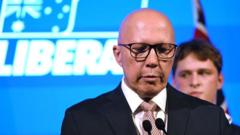Australia's political landscape is witnessing seismic shifts following the Liberal party's historic defeat in Saturday's federal election. The loss, which has been described as potentially the most crushing in the party's history, has left its leader Peter Dutton grappling with the fallout. Dutton, a long-standing member of parliament, was ousted from his own seat in Dickson after 24 years, marking the first time a federal opposition leader has lost their seat alongside a national defeat.
Labor's sweeping victory prompted an urgent reevaluation within the Liberal party, with calls for a comprehensive review of their campaign strategies. Liberal MP Keith Wolahan emphasized the importance of recognizing that "things went wrong," urging his party to heed the voters' discontent. The fallout of the election is particularly pronounced in major urban areas, where the Liberal party faced significant losses, effectively diminishing their presence in cities such as Sydney, Melbourne, Brisbane, and Adelaide.
In the wake of the election, PM Anthony Albanese characterized the public's choice as a plea for national unity rather than divisiveness. Analysts have pointed to a myriad of factors contributing to the Liberal party's downfall, including the perceived influence of former U.S. President Donald Trump and the party's alignment with his controversial politics.
As Dutton's reign comes to an end, the future leadership of the party is up for grabs, with potential candidates like shadow treasurer Angus Taylor and deputy leader Sussan Ley being suggested for the role. However, with no clear frontrunner, the Liberal party is now faced not only with finding new leadership but also with the daunting task of redefining its strategy to regain lost voter confidence ahead of the next election in 2025.

















